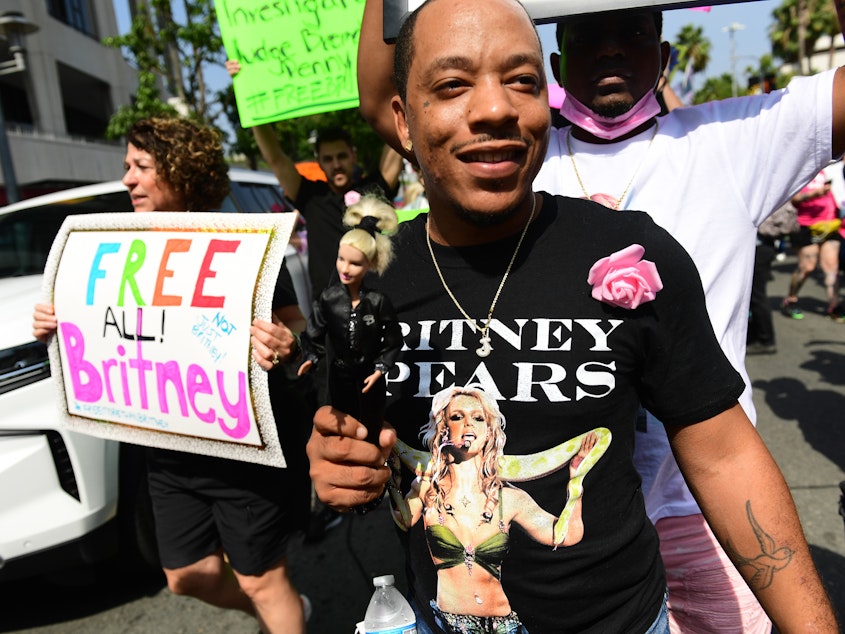Britney Spears is on the road to independence. The media should let her take the wheel

On Wednesday, Britney Spears won a major victory in her fight to reclaim her personal independence and autonomy. Her father, Jamie Spears, was suspended from the conservatorship he initiated 13 years ago and has overseen for much of the time since — a situation that the pop star says her father exploited for his own financial benefit. At the next hearing, scheduled for Nov. 12, Los Angeles Superior Court Judge Brenda J. Penny will weigh motions from both sides to terminate the conservatorship altogether.
Even this latest round in the Britney Spears saga has played out far more publicly than the pop star appears to have wanted, though she has often thanked #FreeBritney activists for their support and encouragement. As Wednesday's hearing approached, a small platoon of Britney Spears documentaries were released, and those seem to be drawing her ire.
Some of those projects may ultimately aid her cause, such as the pair of New York Times investigative documentaries that revealed allegations her lawyer, Mathew Rosengart, has cited in his court filings. In the most recent one, Controlling Britney Spears, a former cybersecurity specialist on Spears' security team alleges that the security company for which he worked surveilled the pop star at her father's request, installing listening devices in her bedroom at her California home and mirroring all her text and phone communications. According to the documentary, those conversations included ones that Britney Spears had with her sons, boyfriend, mother and legal counsel.
Other documentaries seem more attuned to capitalizing on — and monetizing — this moment. Considering the extent to which her life became grist for the paparazzi, it's understandable that Spears herself seems to be wary of all such projects and of the various filmmakers' intentions. "It's really crazy guys," she wrote earlier this week in an Instagram post filled with emojis. "I watched a little bit of the last documentary and I must say I scratched my head a couple of times !!! I really try to disassociate myself from the drama !!! Number one ... that's the past !!! Number two ... can the dialogue get any classier??? Number three ... wow they used the most beautiful footage of me in the world !!! What can I say .. the EFFORT on their part !!!"
It's unclear exactly which "last" documentary she meant, given how many have been released in the days running up to Wednesday's hearing. Last Friday, FX and Hulu premiered the Times documentary Controlling Britney Spears; on Sunday, CNN released a special called Toxic: Britney Spears' Battle for Freedom; and on Tuesday, Netflix began streaming Britney vs. Spears.
Sponsored
When the first New York Times documentary came out in March, Spears expressed similar sentiments. In an Instagram post that is no longer available, Spears wrote: "My life has always been very speculated [sic] ... watched ... and judged really my whole life !!! ... I didn't watch the documentary but from what I did see of it I was embarrassed by the light they put me in ... I cried for two weeks and well .... I still cry sometimes !!!!"
For a woman who has recently written that she grew up "in a world where basically almost everything I did was controlled by someone else," 2021 might well feel like 2007-08 all over again, when her life and personal challenges became the literal livelihood of parasitic paparazzi and "concerned" media.
This time is already different, at least in certain respects: Spears' situation has shone a light on the broader issues of conservatorship, with everyone from disability rights activists to members of Congress eager to use this moment to highlight problems and abuses. Spears' own attorney, Rosengart, evoked that in the press conference he held after Wednesday's hearing, saying: "As important as this matter is to Britney — and it is monumental to Britney, because this is a substantial step toward her freedom ... there's a larger issue here." After all, some 1.3 million Americans are currently in similarly structured legal guardianships and conservatorships, and advocates say that once you've been placed in one, it's very difficult to be extracted.
Moreover, the public has now heard Spears herself objecting to the conservatorship. Her fans around the world have aided in harnessing her fame to help her get what she wants, finally, on her own terms. Would she want to incorporate that into her music and stage shows in the years ahead, if she even returns to that kind of spotlight? Certainly, we now know that Spears wants a lengthy break from work — "I deserve to have a two- to three-year break and just, you know, do what I want to do," she told Judge Penny during her powerful testimony at a June court hearing — and the last thing anyone with ties to Spears should want to do at this juncture would be to dictate what she does next, in terms of career or her personal life.
Spears is a pop queen, not a confessional singer-songwriter: who knows if she would ever explicitly weave recent personal experiences into her art? She is in a singular position, however. There are many wonderful female musicians, pop and otherwise, who have written feminist anthems and narratives about staking a claim to their power. There are far fewer musical projects, however, from women who are one, two, three or more decades down the path of adulthood and career who have publicly addressed re-claiming their power and self-agency, of struggling, enduring, and hopefully eventually triumphing.
Sponsored
Many fans would find that very inspiring—and it would be an opportunity for Spears to finally use her own voice. [Copyright 2021 NPR]



